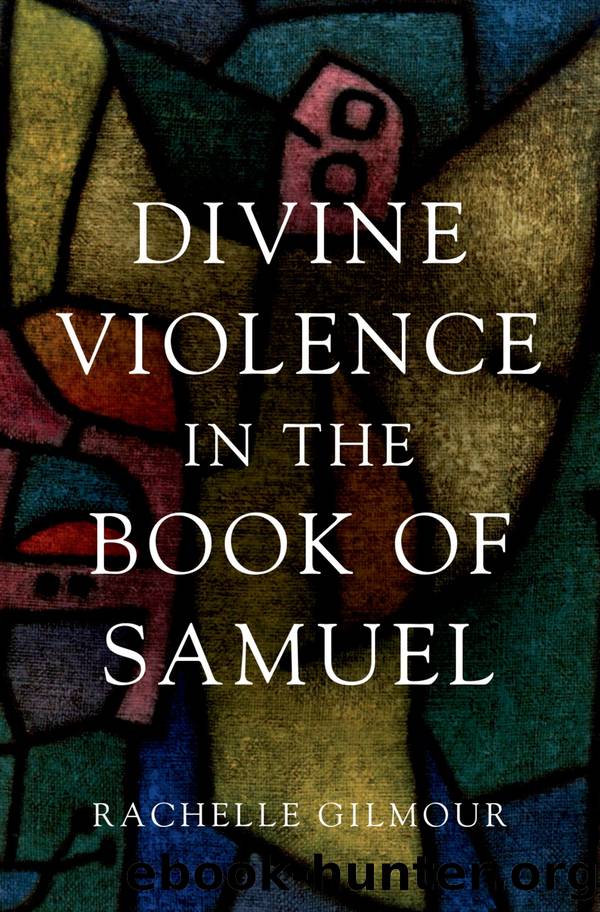Divine Violence in the Book of Samuel by Rachelle Gilmour;

Author:Rachelle Gilmour;
Language: eng
Format: epub
Publisher: OUP Premium
Published: 2021-06-15T00:00:00+00:00
2.2
The Ethics and Characterisation of God, and the Rejection of Saul
In the interpretation of divine violence against Saul, divine favouritism has repeatedly emerged: the absence of Godâs favour for Saul leads to his transgression, and Godâs favour for David contributes to Saulâs punishment and the divine violence against him.
In examining Godâs favouritism, David A. Bosworth writes, âa critical reading of the Books of Samuel suggests that Yhwh has purposes independent of ethics.â1 Bosworthâs argument demonstrates that David is not preferable because David has better ethics: greatness is not the same as goodness. But, does the same argument extend to an evaluation of Godâs actions: can rejecting Saul and selecting David be considered ethical acts if these acts are not based on the comparative ethical merits of each leader? Our analysis has shown that God (unsurprisingly) has purposes independent of Kantian ethics. Saul has broken a command and receives what proves to be proportional consequences to his actions. Yet, Saulâs most serious transgressions take place after the announcement of his punishment, and his sinâs consequences are productive of divine enmity not repayment. I have claimed that Godâs regret is key to Godâs enmity towards Saul, compared to Godâs forgiveness of David. Can divine violence based upon regret, not retribution, have an ethical foundation?
One does not have to wander far in contemporary legal, philosophic, and ethical thought to find critique of Kantian retribution. Just as Kant was our companion in Part 1, helping to highlight textual features that were relevant to retribution, Martha Nussbaum, a more recent philosopher, will be our companion, prompting attention towards âemotions,â or aspects of interiority, regret, favour, and delight, that feature in the narratives of divine violence against Saul. In light of Nussbaumâs virtue ethics approach, an ethical reading of Godâs violence coincides with a literary reading of Godâs characterisation.
Quoting Proust, Martha Nussbaum describes emotions as âgeological upheavals of thought.â2 She writes, âthey mark our lives as uneven, uncertain and prone to reversal.â3 Drawing on the Stoics, Nussbaum proposes that âemotions are forms of evaluative judgment that ascribe to certain things and persons outside a personâs own control great importance for the personâs own flourishing.â4 Emotions direct attention to the things that are important, and so they can interrupt what might otherwise be a personâs impartial evaluation that weighs good and evil of a person, thing, or situation. Emotions should not be considered in opposition to cognition, but rather as cognition that invests objects with value.
Nussbaum gives the example of her attitude towards Finland and the United States. Although she thinks Finland objectively a better country, she has a loyalty to and affection for the United States because it is her own nation.5 Nussbaum also gives the example of the death of her mother. One does not impartially weigh the importance of a person when bereaved. Instead, love for the person and grief from losing the person are evaluative judgements of the personâs value. Emotions embody our deeply rooted views about the world and people, and they
Download
This site does not store any files on its server. We only index and link to content provided by other sites. Please contact the content providers to delete copyright contents if any and email us, we'll remove relevant links or contents immediately.
Fangirl by Rainbow Rowell(8693)
How to Bang a Billionaire by Alexis Hall(7886)
Wonder by R. J. Palacio(7651)
The Space Between by Michelle L. Teichman(6516)
The Thirst by Nesbo Jo(6372)
Assassin’s Fate by Robin Hobb(5773)
Wiseguy by Nicholas Pileggi(5220)
The Night Circus by Erin Morgenstern(4971)
The Kite Runner by Khaled Hosseini(4902)
Paper Towns by Green John(4722)
Bittersweet (True North #1) by Sarina Bowen(4678)
Gerald's Game by Stephen King(4320)
Too Much and Not the Mood by Durga Chew-Bose(4048)
Pillow Thoughts by Courtney Peppernell(3936)
Goodbye Paradise(3384)
Twelve Days of Christmas by Debbie Macomber(3373)
Good by S. Walden(3294)
The Rosie Effect by Graeme Simsion(3150)
The Cellar by Natasha Preston(3035)
